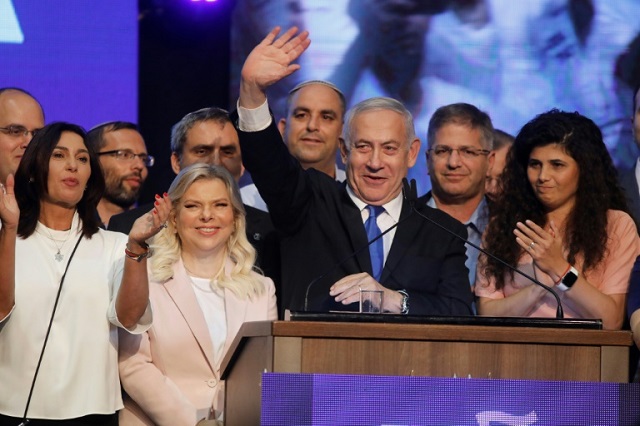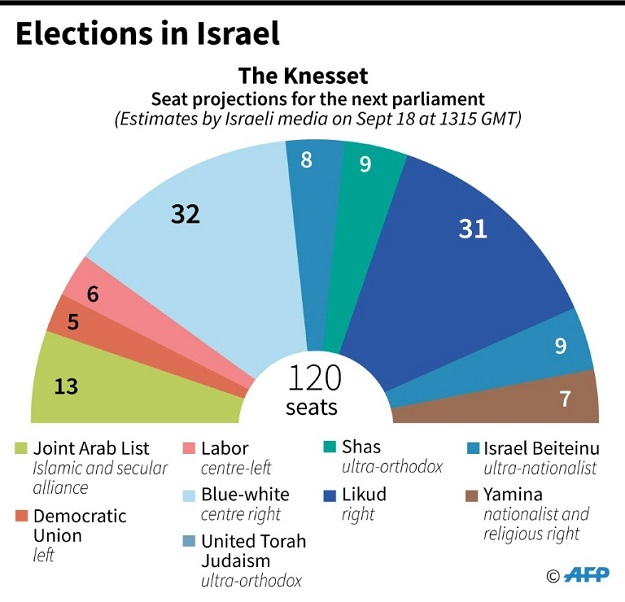
In a sign of the demanding negotiations to come, sources in Netanyahu's office said he was cancelling a planned trip next week to the UN General Assembly in New York due to the "political context" in Israel.
He had been due to meet his "friend" US President Donald Trump on the fringes of the international gathering to discuss a defence treaty between the two allies.
Netanyahu, Gantz supporters in waiting game as poll results trickle in
But Israel's longest-serving premier is staying home as he battles to retain his grip on power.
 Netanyahu's challenger, fomer armed forces chief Benny Gantz, has called for a "broad unity government" after unofficial results gave neither man any obvious path to form a majority coalition. PHOTO: AFP
Netanyahu's challenger, fomer armed forces chief Benny Gantz, has called for a "broad unity government" after unofficial results gave neither man any obvious path to form a majority coalition. PHOTO: AFPWith more than 95 per cent of ballots counted, Netanyahu's right-wing Likud had 32 seats, while Gantz's Blue and White took 33 places in Israel's 120-member parliament.
Gantz's slim lead, however, gave no obvious path for either party to form a majority coalition, raising the possibility of negotiations towards a unity government.
"There are only two options, a government led by me or a dangerous government dependent on the Arab parties," Netanyahu told a press conference in Jerusalem on Wednesday night.
"In these times, more than ever, when we face enormous security and political challenges, it cannot be that there will be a government that depends on anti-Zionist Arab parties," he said.
Throughout his campaign, Netanyahu warned, as he has in previous elections, that left-wing and Arab voters were showing up in large numbers to try to oust him.
Media said the mainly Arab Joint List alliance was set to become the third-largest bloc in parliament with 13 seats.
"The Netanyahu era is over," said Ahmed Tibi, one of the list's leaders. "If Gantz calls, we shall tell him our conditions for supporting him."
If the initial results hold, it will be a major setback for Netanyahu, who hoped to form a right-wing coalition similar to his current administration as he faces the possibility of a corruption indictment in the weeks ahead.
Gantz, addressing supporters in Tel Aviv, called for a "broad unity government" but cautioned that he was waiting for final results.
"We will act to form a broad unity government that will express the will of the people," the former armed forces chief said.
"We will begin negotiations and I will speak with everyone."
Ex-defence minister Avigdor Lieberman could prove to be kingmaker, with the reported results giving his secular-nationalist party Yisrael Beitenu nine seats.
He has not declared in favour of either of the two leading contenders.
"There is only one option for us," he has stated.
"That is to form a broad, liberal, national unity government" with Yisrael Beitenu, Blue and White and Likud.
Such a government would not include the ultra-Orthodox Jews.
The staunchly secularist Lieberman has long campaigned against what he sees as their undue clout which he accuses of seeking to impose Jewish religious law on Israel's secular population.
He would also not partner with Arab parties.
"Israel has a problem," the top-selling daily Yediot Aharonot newspaper wrote Wednesday. "We have been afflicted with the disease of hatred."
"Some people want to sharpen the divisions and to see a clear division between 'left' and 'right' but that is precisely the way to worsen the disease."
Whatever the shape of the next Israeli government, the Palestinians are prepared to talk peace, said their foreign minister, Riyad al-Maliki.
"Whoever will be able to form a government, we are ready to sit with him or her in order to restart the negotiations," Maliki told reporters in Oslo, accompanying president Mahmud Abbas on a two-day visit.
But Abbas later gave a blunt assessment of Palestinian preferences for a new Israeli government.
"Our position: against Netanyahu," he said.
Israel's Arab parties have traditionally not endorsed anyone for prime minister.
"The main difference in this vote is the turnout among Arab citizens," Joint List leader Ayman Odeh told journalists outside his home in the northern city of Haifa.
 Elections in Israel. PHOTO: AFP
Elections in Israel. PHOTO: AFP"There's no doubt that this is what made the difference. Without that, Netanyahu would already be prime minister."
The election was the second in five months for Israel.
Israel hits Gaza after rockets disrupt Netanyahu rally
President Reuven Rivlin, who must appoint someone to attempt to form the next government, said there was a "need to avoid a third".
Netanyahu suffered one of the biggest defeats of his political career after the previous elections in April.
His Likud along with its right-wing and religious allies won a majority, but he failed to form a coalition and opted for a second election rather than risk having Rivlin choose someone else to try.
The stakes could not be much higher for 69-year-old Netanyahu, who many believe will seek immunity from prosecution should he survive as prime minister.









1732354127-0/Untitled-design-(3)1732354127-0-270x192.webp)







COMMENTS
Comments are moderated and generally will be posted if they are on-topic and not abusive.
For more information, please see our Comments FAQ